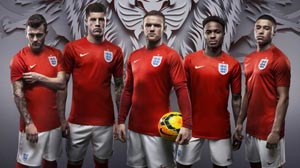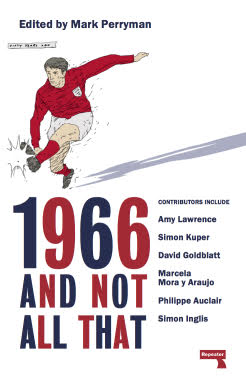
Never Stopped us Dreaming
10.06.2016
As Euro 2016 begins Mark Perryman offers an 11-point plan finally to end England’s years of hurt.
 Five decades on from England’s solitary tournament triumph and as the team prepare yet another effort to end these proverbial 50 years of hurt at Euro 2016 it seems as good a time as any to consider a diagnosis. Given it is the Football Association as the game’s governing body that is responsible for fulfilling the ambition a decent starting point is to ask what the FA is for? Football writer Barney Ronay provides a very reasonable answer:
Five decades on from England’s solitary tournament triumph and as the team prepare yet another effort to end these proverbial 50 years of hurt at Euro 2016 it seems as good a time as any to consider a diagnosis. Given it is the Football Association as the game’s governing body that is responsible for fulfilling the ambition a decent starting point is to ask what the FA is for? Football writer Barney Ronay provides a very reasonable answer:
“ The real problem for the FA is that it has no real power. It is essentially a front , a fluttering ceremonial brocade of a national sporting body. Football may be rich and powerful, but the FA exists at one remove from this, like Prince Charles complaining pointlessly about architecture from the sidelines.”
And he makes the point that the health of a football nation depends on the active co-operation of forces beyond the sport.
“ The FA neither owns nor controls the mechanics of roots football. It has no power to dictate what Premier League clubs do with young players. It isn’t the nation’s PE teacher. It is instead something of a patsy. One of the FA’s significant functions is to act as a kind of political merkin for the wider problem. Which is, simply, access for all: the right to play, a form of shared national wealth that has been downgraded by those in power for decades.”
Absolutely, the state of the country’s playing fields and publicly owned sports facilities portray a football nation that doesn’t know how to look after itself. It wasn’t the FA’s gross negligence that concreted over football pitches, privatised council leisure facilities to turn them into middle class domains, refused to control fast food and sugar-heavy drinks leaving them to spike up obesity levels and turned childhood into a daily fright-zone killing off three-and-in, jumpers for goalposts, pavement kickabouts within a generation of ’66. No, we can put all of that sorry mess to neoliberal governments from Thatcher onwards.
This is the political context of those years of a failing England team Deregulation, of state and sport. After selling off the elite level of their sport, the Premier League – football’s own version of deregulation - FA as a result has been left with one major responsibility that dwarfs any the others remaining, the national team. To turn that into a responsibility to be proud of and in turn help shift the balance of power and influence from football’s business to sporting interests the ambition has to be to re-establish the England team at the pinnacle of our sport. To do so means challenging sectional and commercial interests for the common good, to ensure the reality of an inclusive England that belongs to all, to celebrate being part of a world game which at its very best is founded on equitability.
To that end I offer an 11-point plan to end the 50 Years of Hurt.
1.Fifty @ 50
Fund 50 grassroots football coaches to provide free coaching support for primary age children, boys and girls. And as a support network approach every player who has represented England from ’66 onwards, every manager, assistant and backroom staff too, offer them a mentoring role for coaches, the kids and their families, with an agreement to provide 50 hours of such support a year. Establish a trust fund to ensure Fifty @50 has the finances to still be around in 2066.
2. The Bobby Moore Centre at Wembley
Right next to Wembley Stadium is one of those facilities providing a number of 5-a-side pitches. It’s privately owned, of no benefit to the FA. What a wasted opportunity. Purchase it outright as the FA’s Bobby Moore Centre, use it as a showpiece to introduce kids, their parents, their club coaches to all that England are trying to achieve at the under 11 level.
3.Take England back on the road
From 2000 to 2007 the old Twin Towers Wembley closed for demolition and reconstruction. Instead England internationals were played not just at Anfield, Old Trafford, Villa Park and St James’ Park but also Ipswich, Leicester, Derby, Southampton, Middlesbrough and Leeds. An England game became a local event and all the more special for that. The support more genuinely national than ever before. The enthusiasm for England up and down the country at World Cup 2002, Euro 2004 and World Cup 2006 surely in part a result. Reopening Wembley squandered all of this. Take England back on the road every year.
4. Schoolboys and schoolgirls double-header international
When the old Wembley closed the tradition of the annual schoolboy international ended with it. Bring them back but with a couple of twists. Alternate between Wembley and one of the top club grounds in the North, make it adouble-header, boys and girls.
5. Bring back the home nations but more too
Bringing back the home nations as an end-of-season tournament for the Under-21s, when not clashingg with their Euros with the added spice of a guest nation. Germany or Argentina for starters, Poland or Australia would attract large expat support, an African team provide experience of coping with unfamiliar playing styles. Run mens and womens tournaments side by side just like cricket and rugby do,
6. Football at the Commonwealth Games
Apart from England, and the other GB nations, every other country gets to play in two global football competitions, the World Cup and the Olympic Games, should they qualify of course. England don’t because Olympic representation is under the banner of ‘Team GB’. There is though another global tournament both England and the home nations could enter to get this crucial extra experience, the Commonwealth Games. Except football unlike rugby sevens isn’t a Commonwealth Games sport. Why on earth not?
7. A squad penalty shoot-out league
Once England have qualified establish a weekly training ground penalty shoot-out competition. Officiated by FA staff, for a dedicated website with a league table of results. And for the final round, the last home friendly before a tournament ends with a penalty shoot-out and fans asked to help by doing everything they can to put our players off.
8. No more Pride, Passion, Belief
‘Pride, Passion, Belief’ used to be the big screen message at Wembley immediately before kick-off for England internationals. Thankfully it’s been taken down but the sentiment remains. They’ll get a team to a Quarter-Final but by now we should have learned not enough to win trophies. The foreign influence if anything hasn’t gone far enough. Owning up to our technical ability deficiencies requires a cultural shift that has to come from below.
9. Bid to host age group World Cups and European Championships
Bid for World and European age group championships. Given half a chance we’ve proved across sports and Olympics to be rather good hosts, and for football we already have the facilities in place and all the evidence suggests decent crowds too.
10. A National Anthem we can call our own
God Save the Queen isn’t England’s anthem. If its good enough for Wales to have one of their own why not us? A song no longer about an institution, but about the nation we’d like to become. It would make the moment when the Anthem is sung a special moment rather than one draped in the otherness of officialdom. Jerusalem, yes please.
11. A 1966 Fiftieth Anniversary FA Congress
An FA Congress bringing together players, coaches, supporters and administrators representing every level of the English game. Football has changed dramatically since ’66, some for the better, some not. But the autocratic way in which it is run has stood absolutely still, if anything it has moved backwards. A Congress to debate in broad terms English football’s future as part of a process towards running the game for all, not just for some.
Does all this add up to England wining the World Cup at some unspecified, or as the current FA Chairman foolishly put it, specified date in the future? Quite possibly not, but the issue here is there is only so much an FA that has given up all its powers to govern the game can do. This plan could be activated by the FA even in their much reduced role. Crucially this would signal a start towards reclaiming the primacy of the national team.
New European and World Champions do emerge, France and Spain have gone from also-rans in ‘66 to finalists and winners. England does manage regularly to reach the quarter-finals, upgrading to becoming regulars in the last four shouldn’t be entirely beyond us. Croatia, Turkey, Bulgaria, Holland and Sweden have all matched that achievement so why with some modest improvements to our situation shouldn’t England? Because both after ’66 the FA utterly failed to act to build on that success, instead assuming there would be more of the same to come. There wasn’t. And then after coming so close again in ’90 the FA did act but with results that proved to be of no help to the England team at all. Many would argue these resulted instead in diminishing whatever prospects it might continue to have. As England line-up in Marseille with a youthful squad threatening to spark an enthusiasm that has scarcely existed since the woeful campaigns at World Cup 2010 and 2014 it is high time to look beyond getting out of a Group. Rather what we really need is a fundamental repositioning of the national team in relation to the game. A people’s England we can all be proud of and part of, and you never know march behind on a victory parade. C’mon, we have the right to dream don’t we?
 Mark Perryman is the editor of the new book 1966 and Not All That. Published by Repeater Books and available from here
Mark Perryman is the editor of the new book 1966 and Not All That. Published by Repeater Books and available from here